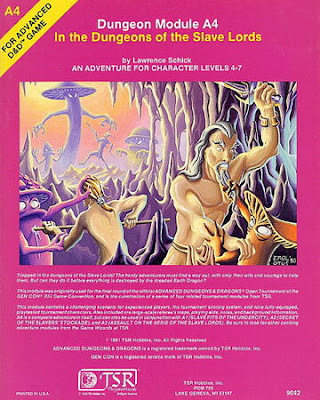Retrospective: In the Dungeons of the Slave Lords
 I'll briefly reiterate what I wrote in my retrospective post of Slave Pits of the Undercity: I have conflicting feelings about the entirety of the "Slave Lords" series of modules. On the one hand, the central conceit of these adventures – taking down a cabal of slavers – is a terrific one very much in keeping with the pulp fantasy roots of Dungeons & Dragons. It's not hard to imagine Conan or Fafhrd and the Gray Mouser engaged in such an endeavor. On the other hand, the modules, as published, feel very contrived and formulaic, owing no doubt to their origins as GenCon tournament modules. There's good stuff in all four of the A-series modules, but none of them quite achieve their full potential in my opinion, which is a shame.
I'll briefly reiterate what I wrote in my retrospective post of Slave Pits of the Undercity: I have conflicting feelings about the entirety of the "Slave Lords" series of modules. On the one hand, the central conceit of these adventures – taking down a cabal of slavers – is a terrific one very much in keeping with the pulp fantasy roots of Dungeons & Dragons. It's not hard to imagine Conan or Fafhrd and the Gray Mouser engaged in such an endeavor. On the other hand, the modules, as published, feel very contrived and formulaic, owing no doubt to their origins as GenCon tournament modules. There's good stuff in all four of the A-series modules, but none of them quite achieve their full potential in my opinion, which is a shame.
That's especially so in the case of the final module in the series, In the Dungeons of the Slave Lords. Written by Lawrence Schick, the adventure is geared toward characters of levels 4–7, like all of its predecessors, though its introductory "Notes for the Dungeon Master" repeatedly points out that "the player's skill, not the character's level, will determine success." That's because it assumes the characters failed in their assault on the aerie of the slave lords (in the module of this name) and were taken captive. Rather than slay the PCs, the slave lords instead throw them into their dungeons, "totally bereft of equipment and spells." Schick comments on this initial situation as follows:
Many players think of their characters in terms of their powers and possessions, rather than as people. Such players will probably be totally at a loss for the first few minutes of play. It is likely that they will be angry at the DM for putting them in such an "unfair" situation. They will demand or beg concessions. DO NOT GIVE THEM ANY HELP, even if they make you feel sorry for them. Inform the players that they must rely on what they have, not what they used to have, and that this includes their brains and their five senses. Good players will actually welcome the challenge of this scenario. All players will ultimately enjoy the module much more if they out on their own resources, rather than with what hints and clues the DM gives them.
Schick accurately predicted the reactions of my friends with whom I played; they were incensed to have had all their characters' gear taken away. I suspect this reaction was commoner if the module was used as part of regular campaign play, as it was in mine, than in a tournament situation, whose players, in my limited experience, are more accepting of such contrivances. Much more interesting, though, is Schick's insistence that the referee neither give the players any help nor feel sorry for them. "Good players," he intones, "will … welcome the challenge." He was accurate in that prediction as well. Once they got past the initial shock of their characters being tossed, nearly naked and unarmed, into dark, dank, caverns, they started to have fun figuring out how best to survive.
That's the main reason why I consider In the Dungeons of the Slave Lords perhaps the most interesting of the A-series modules: it does something unique, namely force the players to use their wits to keep their characters alive. Of course, it probably helps that many of the opponents in the eponymous dungeons are fairly weak – kobolds and giant insects of various kinds – but there are still enough genuine threats to keep them on their toes. This is no cakewalk.
And then there are the myconids, for which I have an inordinate fondness. There's just something about mushrooms and fungi generally that I not only find weirdly appealing but that screams "fantasy!" to me. I suppose my boyhood reading of Lewis Carroll played a role in this peculiar fixation of mine. Regardless, I love the myconids, who are not wholly indifferent to the characters' plight. Indeed, if they agree to perform a service to the myconid king, it will reveal to them an easier means of escaping the dungeons. I have always liked the inclusion of neutral factions in dungeons and Schick does a good job, I think, of showing the potential inherent in such encounters.
The conclusion of the module involves a final confrontation with the slave lords amidst a volcanic eruption that is destroying the villains' home base. Like many aspects of the module, it's all rather contrived and, in my opinion, something of an anticlimax not just to this module but to the whole series. Mind you, disappointment is my overall feeling about these adventures. There's unquestionable potential in them, along with a number of genuinely clever sections and elements, but, in the end, the whole winds up being much less than its parts. I can't help but think that, with a bit more work, the A-series could have been truly memorable, on par with the truly great modules of D&D's past.
James Maliszewski's Blog
- James Maliszewski's profile
- 3 followers



